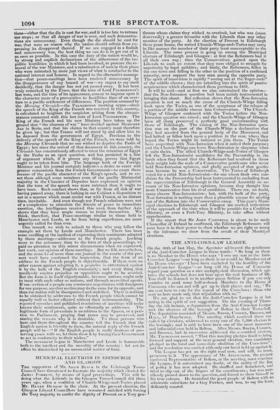MUNICIPAL ELEcnoNs IN EDINBURGH AND GLASGOW.
THE supporters of Mr. ADAM BLACK in the 1.ilinlairgh Town- Council ha ‘e threatened to frustrate the majority which elected Sir JAmcs Foam:mi., by MUMS of legal proceedings. This will be doing what the Liberals in the Glasgow Town-Council did three years ago, when a coalition of Ch urcloWbigs-and- Tories placed .Mr. HENRY DUNLOP in the chair. At the present election, the Glasgow Liberal Councillora have remained satisfied with forcing the Tory majority to confer the dignity of Provost on a Tory gen-
tleman whose claims they wished to overlook, but who was (most deservedly) a greater favourite with the Liberals than any other member of the party. At the election of Provost in Edinburgh three years hence, the united Church-Whigs-and-Tories may carry in like manner the member of their party least unacceptable to the Liberals. The same process is going on among the Municipal electors of Edinburgh and Glasgow : at first the Reformers had it. all their own way ; then the Conservatives gained upon the Liberals to such an extent that they were obliged to struggle for superiority by legal quibbles ; and lastly, the Reformers, fallen in the one town and falling in the other to the position of a confessed minority, must support the best man among the opposite party. The spirit of innovation is rapidly "oozing out at the finger-ends" of the middle classes ; they are subsiding into the spirit of passive' acquiescence which characterized them previous to 1831. It will be said—and at first we also entertained the opinion— that the Non-Intrusion question had been mainly instrumental in bringing this about. But reflection shows that the Non-Intrusion question is not so much the cause of the Church-Whigs falling back upon the Tories, as one of the symptoms of the relapse of a portion of the middle classes into Conservatism. The Church- Whigs of Glasgow coalesced with the Tories before the Non- Intrusion question was raised ; and the Church-Whigs of Glasgow have all along preserved a perfectly good understanding with those of Edinburgh. The raising of the Non-Intrusion ques- tion was on the part of the Church-Whigs a declaration that they had seceded from the general body of' the Movement, and had halted or fallen back upon a position in the rear, where they hoped the Tories might be induced to join them. The Tories have coquetted with Non-Intrusion when it suited their purpose; and the Church-Whigs can leave Non-Intrusion in abeyance when it suits theirs. The allied Church-Whigs-and-Tories of' Glasgow left the Non-Intrusionist candidates for the Provostship in the lurch when they found that the Reformers had resolved to throw their weight into the scale of a Conservative gentleman who never held Non-Intrusion opinions, anti gladly accepted of that gentle- man because he was a Conservative. The Tories of Edinburgh voted for a rabid Non-Intrusionist—for one whom their own can- didate for the Provostship had been instrumental in excluding from the representation of Edinburgh in the General Assembly on ac- count of his Non-Intrusion opinions, because they thought him more Conservative than his rival candidate. There are, no doubt, many sincere Non-Intrusionists ; but, with the bulk of the party, Non-Intrusion is nothing more than a plausible excuse for stealing out of the Reform into the Conservative camp. This year's Muni- cipal elections in Edinburgh and Glasgow are marked indications of' the approach of the time when it will be possible for a Coalition Ministry, or even a Peel-Tory Ministry, to take office without apprehension.
If the report that Sir Join; CAMPBELL is about to be made Chancellor of Ireland be confirmed, the Edinburgh Reformers will soon have it in their power to show whether we are right or wrong in the inference we draw from the result of their Municipal elections,


























 Previous page
Previous page